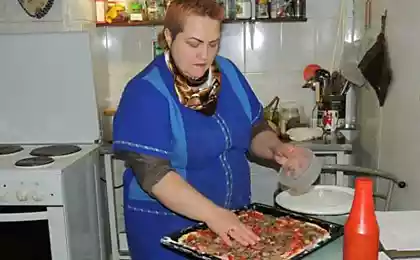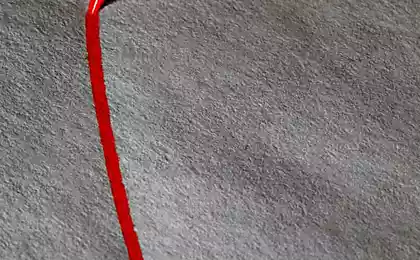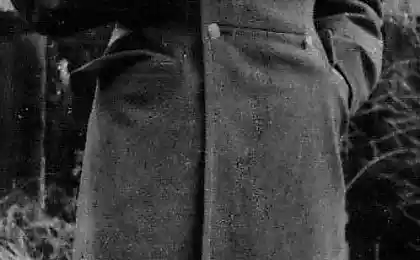477
You will always be my baby!
Quite a lot, and often write about separation from parents, but it would be nice to see what happens "on the wire". The process of something, anyway, is mutual. The complexity of the separation and sometimes the impossibility of its completion lurk and parents. In this article I will not discuss the difficulties encountered by parents whose children are in adolescence. Here the separation from the family in the phase of active hostilities.
I want to talk about parents of adult children. Thus we make the assumption that a considerable part of its course, the kids still held. On a psychological level they are more or less Mature personality with constructed, but flexible boundaries. In social terms — an independent life, i.e. home, work, and possibly already own family. A variety of unfavorable options with addictions, antisocial behavior and such here will not consider.

Sketches of the lives of
Let's see what it looks like not the last separation of the parent in everyday life.
Picture 1. Mother visiting adult son/daughter. Comes to visit with a shopping bag full of different products. And it's not "something for tea" as a tribute to traditions. Sweet food set may not be, if the mother believes that her sweet "baby" is harmful. No, the bag will have everything for cooking soup, the stock of cereals in a couple of years and anything else useful. Cooking will start immediately, bypassing the stage tea. In some cases, it may come with Sudocrem ready-made soup. Then immediately move on to the next stage to restore order in the apartment and in the mind of the offspring. Trying to stop was very offended and often sadly repeats, "this is for the best".
Picture 2. Mom calls many times a day, asking health, lunch menu, my grandchildren, if any, and other family members. Immediately gives valuable advice on these points, simultaneously finding out other details of life. If the child tries to reduce the frequency and duration of the interrogation, immediately retorted: "I'm worried about you".
Picture 3. Mom always something happening, and it requires the immediate intervention of her adult child. The number of incidents anything from potekshego crane or needing to dig the potatoes up to a heart attack. If the request is not met immediately, either threatening "your mother is not a pity?", or compassionate: "Who me but you will help?".
Picture 4. The object of attention and control becomes mom's husband(a) her beloved child. To describe the relationship in this triangle does not make sense — for me it is a folklore. I note only that the number jokes and jokes about mother-in-law greatly exceeds the number of stories about mothers-in-law. And for good reason: joking about the first one, once of course the woman in a man's life — a more expensive.
Picture 5. Let's have of the popes. If you omit ideological disagreement about football teams and political parties, dads often give advice on how to work. Comparing the success of offspring with their career and other life accomplishments over the same period. Give detailed plans and instructions on how to reach the next Olympus, under the motto: "I know better".
Parents usually have in the Arsenal of a few favorite strategies combining any of the above, and many other modalities. The apotheosis is often the phrase, "I'm a mother/father!", which should put an end to any debate.
Oh, and one more attempt to reason with the parent with a reminder of how old the "little child", how long it lives alone and his mind is often suppressed by phrases such as: "But for me you'll always be my little baby".

What actually lies behind these pictures?
Manipulation. All the above expressions are not. Briefly remind you that manipulation is a specific way to get from the subject the desired.The peculiarity is that manipulative message contains some truthful part, through which it penetrates into the consciousness and about the part that in combination with the truth enters the brain in a stupor.
So, the truth is that the parties are close of kin, to care, to worry, to help each other. And true that:
But there is another helplessness of parents before their own life. This so-called "empty nest syndrome". The role of the child's parent ended, and to the fore again and in a new role as face of women/men, wife, various social incarnations. Not everyone is psychologically prepared to cope with them. So by all means pull the chick back to the nest to drown out my own anxiety before the challenges of the changed realities.
The power and control. This is the flip side of helplessness. Its changed the life of the parent is difficult to control, and process control for a child lined up and perfected over the years. And the fact that he grew up trying to avoid the overseer of an eye, maybe even to stir excitement.
As for power in a negative sense when an adult is asserting itself at the expense of the child, it is initially misalignment and dysfunction.Look from the top down and the tone of statements in relation to an adult are a direct aggression. Such messages sound like orders from the master to the slave. I think relevant is the comparison, not the relationship "boss-subordinate". Adequate communication of the superior and subordinate is happening in a slightly different plane.Such communication from the top down, regardless of intentions, is a gross violation of personal boundaries and automatically causes a desire to protect them — that is, reciprocal aggression. It can be expressed in the passive form: in response to the silent or agree to the sight, but inside the frustration and anger, which then will be fonit, and to spoil relations.
Distrust. Here I will refer to the concept of E. Erickson, in which, in particular, there are such things as "basic trust in the world", "competence", "generativist". The latter refers to the age of 25-60 years and means the ability to generate, in the broad sense of the word. But this is not enough, you need to created has contributed to the flow of life. The return of the "debt" of life, as previously people mostly only takes the world's resources.
So, the mentioned terms in relation to our problem may exist in the following combinations:
And the more a parent tries to use those strategies to be present in the life of the adult son or daughter, than actively imposing outdated behavior patterns and roles, the more tension in the interaction and the stronger the desire to distance themselves from children. That is, the desired effect is the opposite. While the communication of adults, based on mutual respect pictures of the world each, on the careful treatment of the limits of the other, only strengthens kinship relationships.
If your relationship with your parents present any of the above mentioned, do not rush to show them the article. Behind this probably lies the desire to "reeducate" them, to if not perfect, good enough parents. And that means that your separation is far from complete.
So train neutrality, explore and learn to defend their borders eco-friendly non-aggressive ways.And then your parents will also be able to join the game by adult rules. published
Author: Olga Mityagin
P. S. And remember, just changing your mind — together we change the world! © econet
Source: www.matrony.ru/dlya-menya-tyi-vsegda-budesh-rebenkom/
I want to talk about parents of adult children. Thus we make the assumption that a considerable part of its course, the kids still held. On a psychological level they are more or less Mature personality with constructed, but flexible boundaries. In social terms — an independent life, i.e. home, work, and possibly already own family. A variety of unfavorable options with addictions, antisocial behavior and such here will not consider.

Sketches of the lives of
Let's see what it looks like not the last separation of the parent in everyday life.
Picture 1. Mother visiting adult son/daughter. Comes to visit with a shopping bag full of different products. And it's not "something for tea" as a tribute to traditions. Sweet food set may not be, if the mother believes that her sweet "baby" is harmful. No, the bag will have everything for cooking soup, the stock of cereals in a couple of years and anything else useful. Cooking will start immediately, bypassing the stage tea. In some cases, it may come with Sudocrem ready-made soup. Then immediately move on to the next stage to restore order in the apartment and in the mind of the offspring. Trying to stop was very offended and often sadly repeats, "this is for the best".
Picture 2. Mom calls many times a day, asking health, lunch menu, my grandchildren, if any, and other family members. Immediately gives valuable advice on these points, simultaneously finding out other details of life. If the child tries to reduce the frequency and duration of the interrogation, immediately retorted: "I'm worried about you".
Picture 3. Mom always something happening, and it requires the immediate intervention of her adult child. The number of incidents anything from potekshego crane or needing to dig the potatoes up to a heart attack. If the request is not met immediately, either threatening "your mother is not a pity?", or compassionate: "Who me but you will help?".
Picture 4. The object of attention and control becomes mom's husband(a) her beloved child. To describe the relationship in this triangle does not make sense — for me it is a folklore. I note only that the number jokes and jokes about mother-in-law greatly exceeds the number of stories about mothers-in-law. And for good reason: joking about the first one, once of course the woman in a man's life — a more expensive.
Picture 5. Let's have of the popes. If you omit ideological disagreement about football teams and political parties, dads often give advice on how to work. Comparing the success of offspring with their career and other life accomplishments over the same period. Give detailed plans and instructions on how to reach the next Olympus, under the motto: "I know better".
Parents usually have in the Arsenal of a few favorite strategies combining any of the above, and many other modalities. The apotheosis is often the phrase, "I'm a mother/father!", which should put an end to any debate.
Oh, and one more attempt to reason with the parent with a reminder of how old the "little child", how long it lives alone and his mind is often suppressed by phrases such as: "But for me you'll always be my little baby".

What actually lies behind these pictures?
Manipulation. All the above expressions are not. Briefly remind you that manipulation is a specific way to get from the subject the desired.The peculiarity is that manipulative message contains some truthful part, through which it penetrates into the consciousness and about the part that in combination with the truth enters the brain in a stupor.
So, the truth is that the parties are close of kin, to care, to worry, to help each other. And true that:
- this parent-child relationship, including that characterized by the vertical organization and the way of communication. Parent-child relationships ended at the moment when the child became an adult at least formally. Further synergies should be built in the plane of the "adult-adult", that is, on an equal footing, that does not preclude reverence for elders;
- mother/father based on the fact that they are, can break the boundaries of their adult child.Can't do: the limits of personality perform the same function of that state. No boundaries — no state, no full-fledged Mature person.To cross the boundaries of others only with the permission of the receiving party and in compliance with its rules;
- parents know best what is needed and how, as they age and life experience is greater. But nobody has the right to determine what is best or what you need another person, unless the latter is not officially incapacitated. Even if an adult child makes a mistake, he has that right — it's his life;
- grown-up son/daughter have endlessly for what they have given birth, raised and the list goes on. This is perhaps the most difficult item. "Debt" for the gift of life is given... life itself. The birth of children, creative activities. A measure of attention, care and assistance to slowly your aging parents to determine much more difficult. It depends and prevailing attitudes, and by many external circumstances and cultural customs and traditions. One thing: if this "debt", the separation has not yet taken place.
But there is another helplessness of parents before their own life. This so-called "empty nest syndrome". The role of the child's parent ended, and to the fore again and in a new role as face of women/men, wife, various social incarnations. Not everyone is psychologically prepared to cope with them. So by all means pull the chick back to the nest to drown out my own anxiety before the challenges of the changed realities.
The power and control. This is the flip side of helplessness. Its changed the life of the parent is difficult to control, and process control for a child lined up and perfected over the years. And the fact that he grew up trying to avoid the overseer of an eye, maybe even to stir excitement.
As for power in a negative sense when an adult is asserting itself at the expense of the child, it is initially misalignment and dysfunction.Look from the top down and the tone of statements in relation to an adult are a direct aggression. Such messages sound like orders from the master to the slave. I think relevant is the comparison, not the relationship "boss-subordinate". Adequate communication of the superior and subordinate is happening in a slightly different plane.Such communication from the top down, regardless of intentions, is a gross violation of personal boundaries and automatically causes a desire to protect them — that is, reciprocal aggression. It can be expressed in the passive form: in response to the silent or agree to the sight, but inside the frustration and anger, which then will be fonit, and to spoil relations.
Distrust. Here I will refer to the concept of E. Erickson, in which, in particular, there are such things as "basic trust in the world", "competence", "generativist". The latter refers to the age of 25-60 years and means the ability to generate, in the broad sense of the word. But this is not enough, you need to created has contributed to the flow of life. The return of the "debt" of life, as previously people mostly only takes the world's resources.
So, the mentioned terms in relation to our problem may exist in the following combinations:
- parent does not feel very competent, they do not trust themselves in the education of the child. As a result, his creation is not good enough, and before releasing him into the world, you need something else to do, to dologite, divaspati;
- if the parent's difficulties with confidence in the world, then there is the world is not good enough for his work. And then there will be an unconscious desire not to let the awful child in adult life;
- the combination of the two previous patterns — a dangerous mix. If the child managed somehow to separate from parents, it is likely accompanied by the rupture of relations.
And the more a parent tries to use those strategies to be present in the life of the adult son or daughter, than actively imposing outdated behavior patterns and roles, the more tension in the interaction and the stronger the desire to distance themselves from children. That is, the desired effect is the opposite. While the communication of adults, based on mutual respect pictures of the world each, on the careful treatment of the limits of the other, only strengthens kinship relationships.
If your relationship with your parents present any of the above mentioned, do not rush to show them the article. Behind this probably lies the desire to "reeducate" them, to if not perfect, good enough parents. And that means that your separation is far from complete.
So train neutrality, explore and learn to defend their borders eco-friendly non-aggressive ways.And then your parents will also be able to join the game by adult rules. published
Author: Olga Mityagin
P. S. And remember, just changing your mind — together we change the world! © econet
Source: www.matrony.ru/dlya-menya-tyi-vsegda-budesh-rebenkom/























